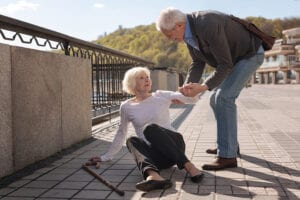Warning Signs Your Older Family Member Could Be Headed for a Fall
 The Centers for Disease Control and Prevention (CDC) reports that millions of people who are 65 or older fall every year. Simply being over 65 increases a person’s risk of falling, but there are several other things that can put your aging relative at an even higher risk. In fact, they could be considered warning signs of a future fall. Knowing what the warning signs are can help caregivers to take steps toward preventing falls. Below are some of the warning signs of a fall that you should know.
The Centers for Disease Control and Prevention (CDC) reports that millions of people who are 65 or older fall every year. Simply being over 65 increases a person’s risk of falling, but there are several other things that can put your aging relative at an even higher risk. In fact, they could be considered warning signs of a future fall. Knowing what the warning signs are can help caregivers to take steps toward preventing falls. Below are some of the warning signs of a fall that you should know.
A Previous Fall
If your aging relative has fallen in the past, they are at double the risk for falling again. However, many older adults don’t tell their doctors they fell, so it’s possible your loved one isn’t telling you about falls either. Watch for signs that a fall may have occurred, such as bruises, scrapes, or other injuries.
Confusion
If your older family member has cognitive issues that cause them to be confused, such as dementia, they could fall. Sometimes the older adult might wake up and not recognize their surroundings, which could cause them to panic and fall.
Avoiding Stairs
Have you noticed that the older adult avoids going up and down stairs? Perhaps they opt for the elevator even when they would only have to walk one short flight of stairs. If so, it could be because they are experiencing muscle weakness or balance issues.
Difficulty Getting Up from a Chair
Pay attention when the older adult is standing up from a chair. Do they stand up easily or does it take them a few tries? Being unable to get up from a chair easily is a sign of limb weakness that could lead to a fall. In fact, many seniors fall when they are trying to get up from a chair or sit down in one.
Lack of Exercise
Seniors who spend a lot of time sitting and don’t exercise regularly will lose muscle tone. Without strong muscles, a fall becomes more likely. The senior’s legs won’t support them well and could give out, leading to an injury.
If your loved one is at an increased risk for falling, elder care can help to keep them safer. Elder care providers can remind the senior to use a newly acquired mobility device, like a cane or walker. Elder care providers can also hold the senior’s arm when they walk, offering them some additional support and balance.
Sources
https://dailycaring.com/prevent-falls-with-5-warning-signs-of-mobility-issues-in-seniors/
https://www.nia.nih.gov/health/prevent-falls-and-fractures
https://www.cdc.gov/homeandrecreationalsafety/falls/adultfalls.html
If you or an aging loved one is considering elder care in East Brunswick, NJ, please contact the caring staff at Care Street Home Care today. Call (732) 607-8870.
- Signs Your Senior Parent Needs Home Care Assistance - January 17, 2025
- Hearing Rehabilitation: Empowering Seniors for Better Living - January 10, 2025
- Understanding How Cartilage Changes Over the Years - January 3, 2025
